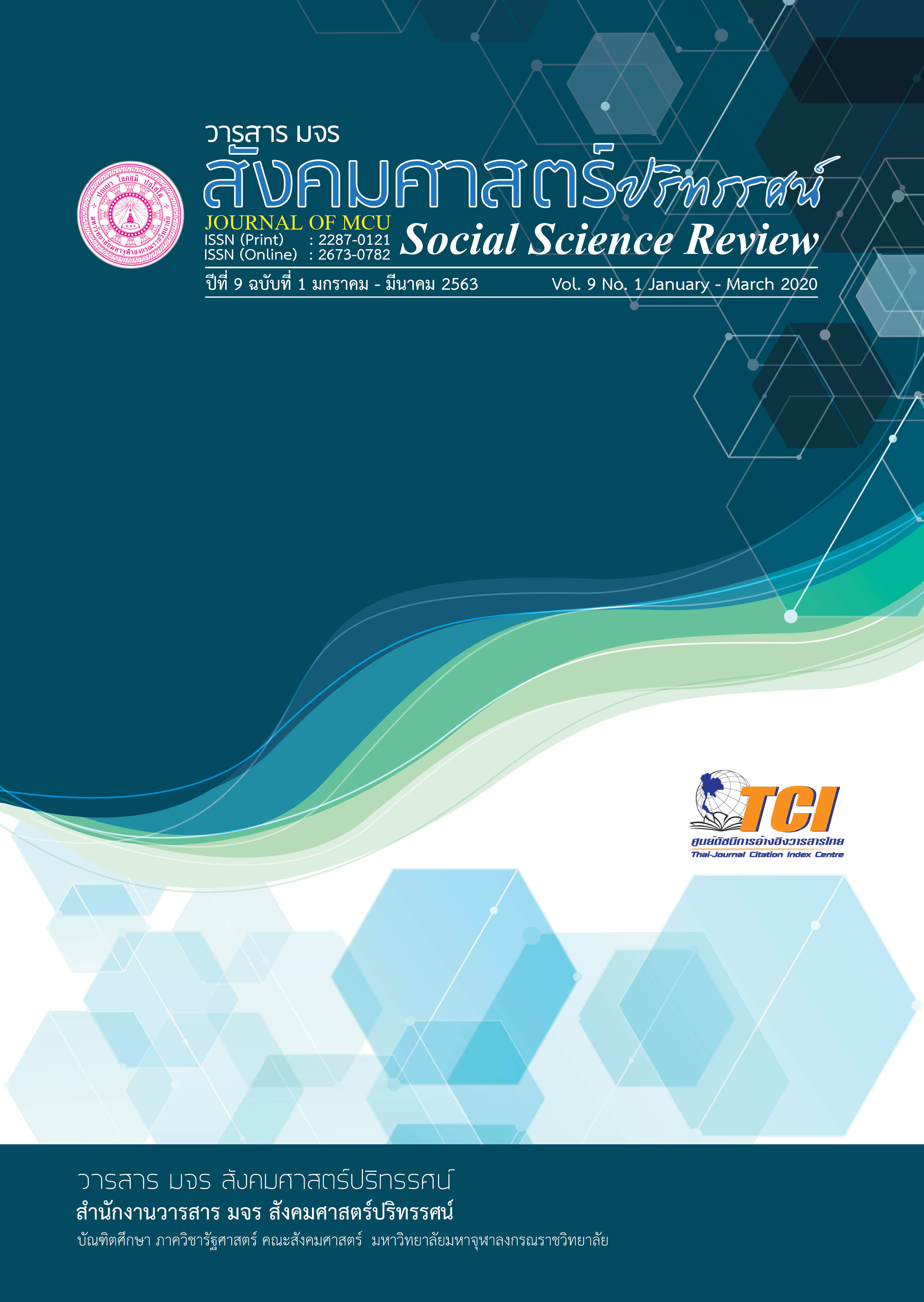แนวคิดทางการเมืองของขงเบ้งในวรรณกรรมสามก๊กที่มีต่อสังคมไทย
คำสำคัญ:
แนวคิดทางการเมือง, วรรณกรรมสามก๊ก, ขงเบ้งบทคัดย่อ
บทความวิจัยนี้มีวัตถุประสงค์เพื่อศึกษาแนวคิดทางการเมืองของขงเบ้งในวรรณกรรมสามก๊ก ศึกษาแรงจูงใจที่ทำให้เกิดแนวคิดทางการเมืองของขงเบ้ง และศึกษาอิทธิพลจากแนวคิดทางการเมืองของขงเบ้งในวรรณกรรมสามก๊กที่มีต่อสังคมไทย เป็นการวิจัยเชิงคุณภาพ ผลการวิจัยพบว่า 1. แนวคิดทางการเมืองของขงเบ้ง ได้แก่ พระมหากษัตริย์ทรงจัดระเบียบสังคม ทรงเป็นศูนย์รวมจิตใจ ทรงปกครองโดยบารมี ทรงถืออาญาสิทธิ์ และทรงอยู่ในฐานะเป็นที่เคารพสักการะ 2. แรงจูงใจที่ทำให้เกิดแนวคิดทางการเมืองของขงเบ้ง ได้แก่ ความต้องการประสบผลสำเร็จของเล่าปี่ ความต้องการความไว้วางใจจากเล่าปี่ และความต้องการอำนาจบารมีของเล่าปี่ 3. แนวคิดทางการเมืองของขงเบ้งที่มีต่อสังคมไทย ได้แก่ การจัดระเบียบสังคมให้เป็นปกติสุข การเป็นศูนย์กลางระบบสังคมการเมืองที่มั่นคง การปกครองโดยบารมีให้ประชาชนเคารพปฏิบัติตาม การดำเนินงานภายใต้กฎหมาย และการดำรงตนเป็นที่เคารพของราษฎร และแรงบันดาลใจในการดำเนินกิจกรรมทางสังคมการเมืองไทย
เอกสารอ้างอิง
คึกฤทธิ์ ปราโมช. (2530). สามก๊กฉบับนายทุน โจโฉ นายกตลอดกาล. กรุงเทพฯ : สยามรัฐ.
เจริญ วรรธนะสิน. (2562). สามก๊ก : ฉบับนักบริหาร. กรุงเทพฯ: แสงดาว.
เจ้าพระยาพระคลัง (หน). (2547). สามก๊ก (เล่ม 1- เล่ม 3) (พิมพ์ครั้งที่ 22). กรุงเทพฯ: ดอกหญ้า.
ชัชวนันท์ สันธิเดช. (2563, 28 มกราคม). นักเขียนและแฟนพันธุ์แท้สามก๊ก 2551. [บทสัมภาษณ์].
ชูวงศ์ อุบาลี และธงชัย วงศ์ชัยสุวรรณ. (2559). พัฒนาการของการเปลี่ยนกระบวนทัศน์ทางยุทธศาสตร์ในสังคมไทย ศึกษาผ่านการตีความตัวบทสามก๊ก. วารสารการเมืองการปกครอง, 6(1), 428-442.
ไชยันต์ ไชยพร. (2547). แนวคิดทางการเมืองและสังคมตะวันตก. เอกสารการสอนชุดวิชาแนวคิดทางการเมืองและสังคม. นนทบุรี: มหาวิทยาลัยสุโขทัยธรรมาธิราช.
ทองแถม นาถจำนง. (2543). กลยุทธ์สามก๊ก : สรุปบทเรียนความพ่ายแพ้ พลิกฟื้นสู่ชัยชนะ.กรุงเทพฯ : ชุมศิลป์ธรรมดา.
นพดล ธนากิจบริสุทธิ์. (2556). แนวคิดและพระบรมราโชบายทางการเมืองของพระบาทสมเด็จพระจุลจอมเกล้าเจ้าอยู่หัวตามกรอบแนวคิดทางการเมืองของมาเคียเวลลี (วิทยานิพนธ์ปริญญารัฐศาสตรมหาบัณฑิต สาขาวิชารัฐศาสตร์). นนทบุรี: มหาวิทยาลัยสุโขทัยธรรมาธิราช.
นิธิพันธ์ วิประวิทย์. (2563, 26 มกราคม). แฟนพันธุ์แท้ราชวงศ์จีน 2556 นักเขียน และสถาปนิก [บทสัมภาษณ์].
ปวิตร กิจจานุเคราะห์. (2553). ถอดรหัสสามก๊ก: ครองใจคน ครองใจงาน. กรุงเทพฯ : เอพี ครีเอทีฟ.
พระเจ้าบรมวงศ์เธอ กรมพระดำรงราชานุภาพ. (2471). ตำนานหนังสือสามก๊ก. กรุงเทพฯ: โสภณพิพรรฒธนากร.
พระมหาจักรพงศ์ ชินเมธี (คำยอดใจ). (2562). แนวคิดทางการเมืองของขงเบ้งในวรรณกรรมสามก๊กที่มีต่อสังคมไทย (วิทยานิพนธ์ปริญญารัฐศาสตรมหาบัณฑิต สาขาวิชารัฐศาสตร์). พระนครศรีอยุธยา: มหาวิทยาลัยมหาจุฬาลงกรณราชวิทยาลัย.
ไพศาล พืชมงคล. (2550). สามก๊กฉบับคนขายชาติ. กรุงเทพฯ : บ้านพระอาทิตย์.
ภัทระ ฉลาดแพทย์. (2562). วิถีแห่ง ขงจื๊อ ขงเบ้ง โจโฉ สอนให้เป็น “ยอดคน” ไร้ขีดจำกัด. กรุงเทพฯ: บริษัท รุ่งแสงการพิมพ์ จำกัด.
ภิญโญ ไตรสุริยธรรมา. (2555). ที่นี่ตอบโจทย์: อ่านสามก๊ก สังคมไทย. สถานีโทรทัศน์ช่องไทยพีบีเอส. สืบค้น 26 เมษายน 2555, จาก https://www.youtube.com/watch?v=-LYw3bln8Kc&t=17s
ยาขอบ. (2520). สามก๊ก ฉบับวณิพก. กรุงเทพฯ: ผดุงศึกษา.
วิริญญา คล้ายบัว. (2554). ผู้นำทางการเมืองเชิงอุดมคติในวรรณคดีสามก๊ก : วิเคราะห์ภาวะผู้นำของขงเบ้ง (วิทยานิพนธ์ปริญญาศิลปศาสตรมหาบัณฑิต สาขาวิชารัฐศาสตร์). กรุงเทพฯ: มหาวิทยาลัยรามคำแหง.
หนหวย. (2495). สามก๊กฉบับนายหนหวย. กรุงเทพฯ: ผดุงศึกษา.
ดาวน์โหลด
เผยแพร่แล้ว
รูปแบบการอ้างอิง
ฉบับ
ประเภทบทความ
สัญญาอนุญาต
ลิขสิทธิ์ (c) 2020 วารสาร มจร สังคมศาสตร์ปริทรรศน์

อนุญาตภายใต้เงื่อนไข Creative Commons Attribution-NonCommercial-NoDerivatives 4.0 International License.
เพื่อให้เป็นไปตามกฎหมายลิขสิทธิ์ ผู้นิพนธ์ทุกท่านต้องลงลายมือชื่อในแบบฟอร์มใบมอบลิขสิทธิ์บทความให้แก่วารสารฯ พร้อมกับบทความต้นฉบับที่ได้แก้ไขครั้งสุดท้าย นอกจากนี้ ผู้นิพนธ์ทุกท่านต้องยืนยันว่าบทความต้นฉบับที่ส่งมาตีพิมพ์นั้น ได้ส่งมาตีพิมพ์เฉพาะในวารสาร มจร สังคมศาสตร์ปริทรรศน์ เพียงแห่งเดียวเท่านั้น หากมีการใช้ภาพหรือตารางหรือเนื้อหาอื่นๆ ของผู้นิพนธ์อื่นที่ปรากฏในสิ่งตีพิมพ์อื่นมาแล้ว ผู้นิพนธ์ต้องขออนุญาตเจ้าของลิขสิทธิ์ก่อน พร้อมทั้งแสดงหนังสือที่ได้รับการยินยอมต่อบรรณาธิการ ก่อนที่บทความจะได้รับการตีพิมพ์ หากไม่เป็นไปตามข้อกำหนดเบื้องต้น ทางวารสารจะถอดบทความของท่านออกโดยไม่มีข้อยกเว้นใดๆ ทั้งสิ้น





